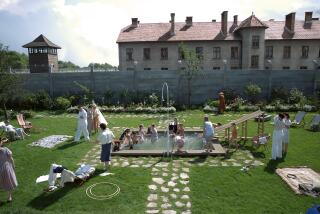Germans Get a Look at Dark Side of Cyberspace
- Share via
BERLIN — Every day there’s another grisly revelation, a new stomach-turning detail about the smiling, smartly dressed computer technician known as “the cannibal.”
The trial of Armin Meiwes -- charged with killing and eating a willing victim he befriended in an Internet chat room -- is taking the German public on a dark ride into the human psyche. It is a glimpse into a hidden world where a disturbed man’s fantasies were advertised and acted upon in a macabre corner of cyberspace.
Among the most startling revelations of the trial so far has been Meiwes’ testimony that more than 200 people answered his ad seeking a young man “who wanted to be eaten.” This has touched off a stream of media commentary about how the Internet -- a tool of wonder and modernity -- has been pressed into serving base and deadly human desires.
“This trial will write judicial history, and it already now belongs to the bizarre side of progress in [electronic] communications,” wrote the daily Der Tagesspiegel as the trial entered its third week. “Without the Internet it would have been unthinkable that such an offer meets such a demand. Now, it is thinkable, but it remains incomprehensible.”
The case has raised concerns across this nation about the Internet’s vast and virtually unregulated terrain. For many Germans, the prospect of a person clicking his or her way through Web sites to find victims has left them uneasy about the power of information technology.
“Be it sexual criminals or necrophiliacs or sadists or masochists, there are hundreds out there on the Internet,” Meiwes told the court, according to the Berliner Morgenpost.
The narrative of the crime is not in dispute. In March 2001, Meiwes, a 41-year-old loner, posted his ad in an Internet chat room. The missive was answered by Bernd Brandes, a 42-year-old Berlin engineer with a history of depression. Meiwes invited Brandes to his half-timbered farmhouse in the central German city of Rotenburg, where Brandes numbed himself with sleeping pills and schnapps.
Meiwes sliced off and cooked part of Brandes’ flesh and the two men ate it, according to court records. Brandes then took a bath while Meiwes read a book. Hours later, Meiwes stabbed Brandes to death, cut his body into pieces and placed them in his freezer. Meiwes told a German magazine that over the next several days he dined on Brandes, sometimes flavoring his meal with oil and garlic while drinking South African red wine.
“I had the fantasy and in the end I fulfilled it,” Meiwes told the court recently in the city of Kassel, where the trial is expected to last until the end of January.
The case touches on seldom-explored legal questions. Cannibalism is not illegal in Germany. Prosecutors are arguing that Meiwes, who was found legally sane, murdered his victim in an act of perverse sexual gratification. Meiwes contends he should not be charged with homicide because Brandes consented to be killed and eaten. His lawyer said the harshest penalty Meiwes should face is “killing on request,” which carries a sentence of six months to five years.
Many tabloids and Web news sites seem less concerned with issues of Internet morality and German jurisprudence than with the lurid details of the case. Dressed in coat and tie, Meiwes, following his lawyer and carrying legal documents, smiles for TV cameras and seems to relish his notoriety as a man of dark secrets. The setting for the killing and trial could hardly be more fitting. Rotenburg and Kassel are on what Germans refer to as Storybook Road, a string of hamlets the Brothers Grimm sketched as landscapes for Hansel and Gretel, Rumpelstiltskin and other unsettling fairy tales.
Stern magazine, with a picture of Meiwes on its cover, took readers inside “the cannibal’s” house. The home is an edifice of creepy images: a hand-held mirror, photos of a strict mother, a bed cluttered with clothes, a dead mouse, a rocking horse and a swing set in a tangle of high grass. Woven around these pictures were vignettes about a boy growing up lonely in a big house and fantasizing about eating a friend so he’d always have someone with him.
Police say they confiscated from the house more than 600 pictures depicting the killing of Brandes and Meiwes’ cannibalism. They also discovered 300 videotapes and 16 computers, a testament to Meiwes’ passion for seeking like-minded men in the ambiguity of cyberspace.
“The one who listens to Armin Meiwes,” wrote the Berliner Morgenpost, “learns a lot about loneliness and alienation. And about the dark side of an otherwise iridescent medium, the Internet. It is opening up so many opportunities, but at the same time it is providing invisible accomplices in countless dark chambers.”
More to Read
Sign up for Essential California
The most important California stories and recommendations in your inbox every morning.
You may occasionally receive promotional content from the Los Angeles Times.













